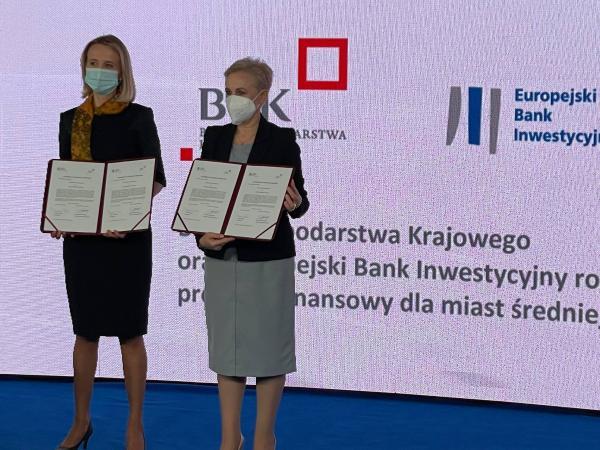
- PLN 700 million (approximately €157 million) made available for investments in sustainable development and pandemic resilience
- The scheme will support cities with fewer than 100 000 residents
Local governments in Poland will be able to implement urban infrastructure and sustainable transport investments, and improve healthcare, social, education, sports and recreation facilities thanks to a new scheme, or credit line, which Bank Gospodarstwa Krajowego (BGK) is launching in cooperation with the European Investment Bank (EIB). Medium-sized cities, with a population of between 50 000 and 100 000 residents, can benefit from loans drawn from an overall facility worth PLN 700 million (approximately €157 million).
With this scheme, which the EIB and BGK have signed today in Warsaw, the two banks aim to provide equal opportunities for medium-sized cities in terms of access to favourable financing. Because smaller centres cannot usually access direct lending from the EIB, the new line from the MUNICIPAL FACILITY & COVID 19 RESPONSE programme bridges this gap. The loan for cities will be available at Bank Gospodarstwa Krajowego starting from the second half of June. It can cover up to 70% of project costs. The repayment period will be up to 25 years.
The funds will help restore the economy after the coronavirus pandemic and finance projects included in municipal multi-annual investment plans (2020-2024), many of which pursue sustainable development goals. Poland, as one of the 193 Member States of the United Nations, has adopted the "2030 Agenda for Sustainable Development." According to the Europe Sustainable Development Report 2020, the country is currently in 16th place in the European ranking that measures the level of implementation of the sustainable development goals.
“EIB loans are designed for the implementation of various urban development projects – from the revitalisation of districts at risk of socioeconomic marginalisation to the construction of affordable housing and expansion of communication systems. Financing for sustainable transport is also growing, including electric buses, trams and modern depots,” said Teresa Czerwińska, vice-president of the European Investment Bank, who oversees operations in Poland. “The new agreement concluded with our long-term partner, BGK, will enable Polish medium-sized cities to continue future-oriented and green investments while a greater financial effort is spent on dealing with the effects of the pandemic.”
“Local governments need funds for investments, especially now when it is so important that we mitigate the effects of the pandemic. Every third zloty of our bank's credit exposure goes to local governments. We want to strengthen the activities of local government units in sustainable development. Our agreement with the European Investment Bank will make it easier to obtain funds, for example, to adapt city infrastructure to climate change,” said Beata Daszyńska-Muzyczka, President of Bank Gospodarstwa Krajowego.
The first such loan by BGK and EIB, in the form of a pilot, was already granted to Ostrów Wielkopolski in September 2020. This city of 70 000 inhabitants located in Western Poland obtained PLN 110 million of EIB financing through BGK. The financing supports almost half of the investments planned by Ostrów Wielkopolski for between 2020 and 2023 to target sustainable growth.
Background information
BGK's involvement in financing the Polish economy amounted to PLN 46 billion at the end of 2021. Poland’s national promotional bank allocated PLN 13 billion to the local government sector. Municipalities invest these funds in sustainable transport, road safety improvements, the protection of nature and culture.
The European Investment Bank has been providing strong financial support to Polish local governments for years. Over the past 10 years, the EIB has granted over €6 billion in direct loans to nearly 40 Polish cities with more than 100 000 residents. The Bank has financed local government investments in a variety of sectors such as urban regeneration, sustainable urban transport, climate change adaptation and mitigation, social housing, education and culture.
The new financial instrument for smaller towns combines the favourable conditions and flexible nature of the loans granted by the EIB with BGK’s in-depth knowledge resulting from its long tradition of supporting Polish municipalities.
Both institutions are currently working on implementing this instrument and launching new, similar initiatives in other sectors in Poland, signalling the intention to forge closer cooperation between the EIB and BGK.


